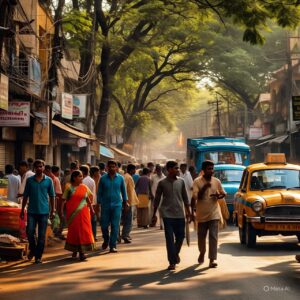Bangalore, also known as Bengaluru, is more than just India’s Silicon Valley. It is a city where tradition meets innovation. From the lively streets of MG Road to the futuristic tech parks of Electronic City, Bangalore tells a story of trade, technology, and transformation.
Let’s explore how this vibrant city connects its old charm with modern business power, making it a leading trade hub in India.
MG Road: Where Commerce Meets Culture
To begin with, MG Road is one of the most famous roads in Bangalore. It has been a major center for business and shopping for decades. Lined with shops, hotels, offices, and banks, MG Road offers a look into Bangalore’s traditional trading culture.
Here, you’ll find everything—from street vendors to luxury boutiques. Popular places like Brigade Road, Church Street, and Commercial Street attract tourists and locals alike. MG Road also connects easily with other parts of the city, thanks to the Namma Metro.
In short, MG Road is the heartbeat of central Bangalore’s retail and business trade.
Transitioning to the Startup Scene: Koramangala and HSR Layout
Moving a little south, the vibe changes. You enter Koramangala and HSR Layout—the hotspots for India’s startup boom. These areas are filled with tech startups, coworking spaces, and digital businesses. Companies like Flipkart started right here.
Startups in these areas range from food delivery and e-commerce to fintech and AI. Cafés double as workspaces, and many young entrepreneurs build their dreams here. As a result, this part of Bangalore has become the engine of new-age commerce.
Moreover, the local community supports growth. You’ll find investors, mentors, and tech talent all within walking distance. In simple terms, this area is where innovation meets opportunity.
Entering Electronic City: Bangalore’s IT Powerhouse
Now, let’s head towards the south. About 20 km from the city center lies Electronic City—the symbol of India’s IT revolution.
Electronic City was planned in the 1970s as a technology and electronics zone. Today, it houses major tech companies like Infosys, Wipro, Siemens, and HCL. These companies drive billions in exports and employ thousands of professionals.
In addition, Electronic City has grown into a full-fledged township. It has schools, hospitals, restaurants, apartments, and tech parks. Thanks to the Electronic City Expressway, commuting is much easier now.
Electronic City plays a key role in Bangalore’s global trade network.
Connecting It All: Infrastructure Boosts Business
Good infrastructure makes trade smoother. Bangalore has been improving its transport and connectivity to support business.
For example, the Namma Metro helps connect key business zones like MG Road, Indiranagar, and Whitefield. The Silk Board to Electronic City elevated corridor has also made travel faster.
Moreover, new projects like the Suburban Railway and Peripheral Ring Road will soon make it easier to move goods and people across the city. With better roads and public transport, trade across Bangalore is only going to grow.
Bangalore’s Diverse Trade Sectors
Bangalore is not just about tech. It is home to many different types of trade and business. Let’s look at a few:
-
Retail trade – Busy markets in Jayanagar, MG Road, and Indiranagar keep the local economy thriving.
-
Information Technology – Tech parks in Electronic City, Whitefield, and Manyata Drive software exports.
-
Real estate – Offices, apartments, and malls support the property and construction trade.
-
E-commerce – Companies like Flipkart and BigBasket boost online shopping and logistics.
-
Textile and garments – Peenya Industrial Area is known for apparel exports.
-
Biotech and aerospace – Emerging sectors that are making Bangalore a leader in innovation-based trade.
In short, Bangalore’s trade network is strong, wide, and growing.
Coworking Spaces: The Modern Marketplaces
Interestingly, today’s business deals don’t always happen in boardrooms. They happen in coworking spaces and tech cafés.
Places like WeWork, 91Springboard, and IndiQube offer young professionals everything they need—Wi-Fi, meeting rooms, and community. These places often host startup events, investor meetups, and product demos.
Just like traditional bazaars were places of trade, these new hubs are where digital commerce is born.
Global Connections: Bangalore’s International Trade Role
Bangalore doesn’t just do business within India. It plays a big role in global trade too. Its software exports reach clients across the US, Europe, and Asia. The city is also gaining importance in aerospace, electronics, and biotech exports.
The Kempegowda International Airport helps manage both passenger and cargo traffic. It connects Bangalore with major global cities. With cargo terminals and freight services, international business flows smoothly.
Foreign companies, consulates, and investors have set up offices in Bangalore. This global interest proves that Bangalore is important in international trade and investment.
Looking Ahead: The Future of Trade in Bangalore
The future looks bright for Bangalore. Several new developments will strengthen its position as a trade capital:
-
The Bangalore Suburban Rail Project will improve connectivity for workers and goods.
-
Smart City Projects will improve urban living and help businesses grow.
-
More tech parks, logistics centers, and innovation hubs are being planned.
-
Green trade, clean energy startups, and digital banking are also rising.
As Bangalore grows, so will its trade network, job opportunities, and global impact.
Final Words
From MG Road’s classic retail streets to Electronic City’s modern tech parks, Bangalore brings together the best of old and new. It is a city that never stops evolving. With strong infrastructure, a thriving startup scene, and global trade links, Bangalore is the true pulse of India’s economic future.
Whether you’re a tourist exploring Brigade Road, a young coder in HSR Layout, or a global investor in Electronic City—Bangalore has something for everyone.
It’s not just a city. It’s a trade journey from the past into the future.


